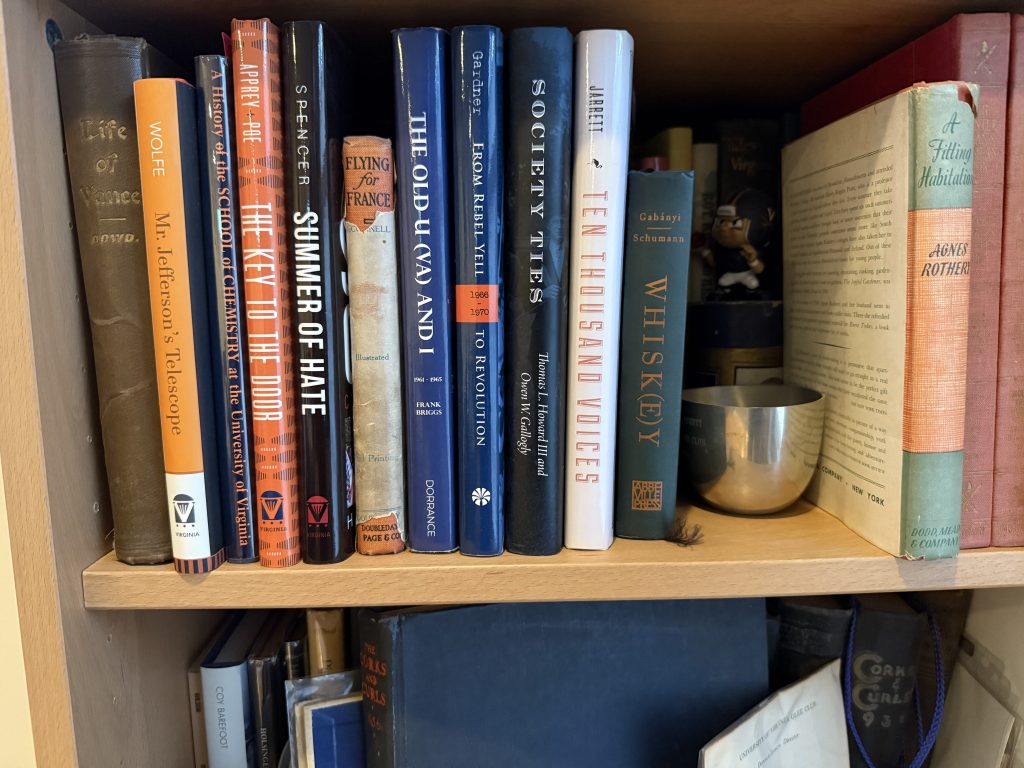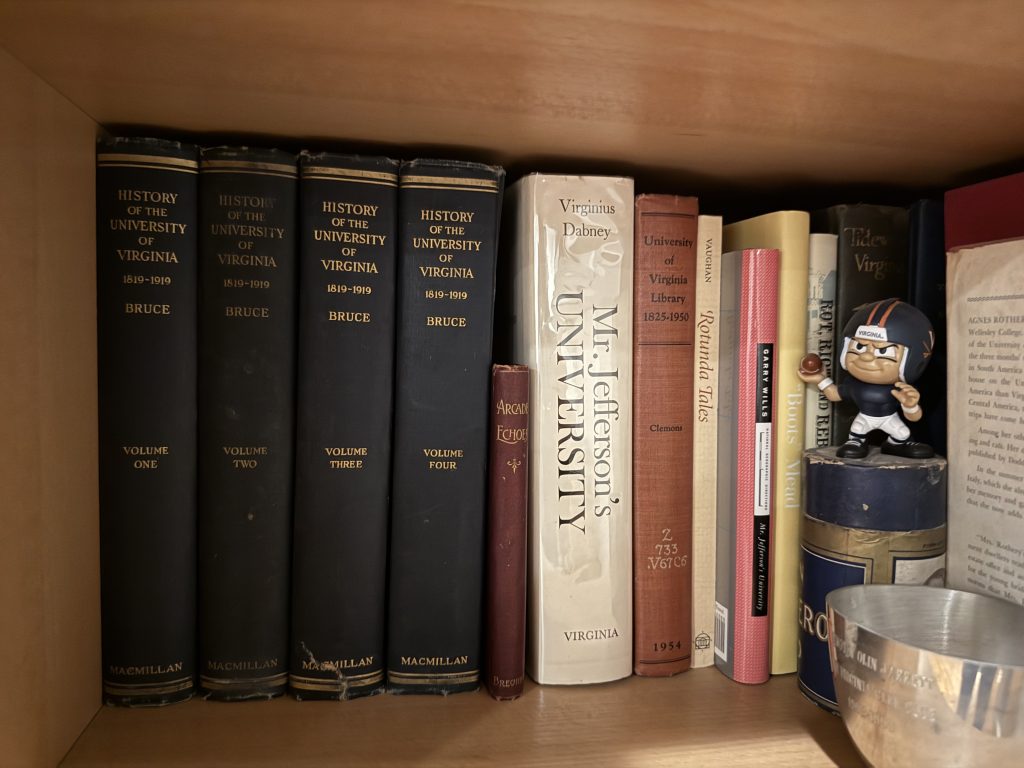
In the course of writing Ten Thousand Voices, I had the opportunity to read a lot of other histories of the University of Virginia. It occurred to me that others might appreciate the reading list of books I have consulted and found, so I pulled together this bibliography. In some cases I’ve quoted my reviews of the books from Goodreads.
Note: I’m going to keep this a live post as I identify additional books worth adding (or move things on my shelves and discover some more…).
Older

Adams, Hubert Baxter (1888). Thomas Jefferson and the University of Virginia. The earliest full history of the University, this handsome book (which you can read on Google Books) contains plates of photographs and architectural drawings of the University. It’s also the first to quote Emerson’s epigraph, “An institution is the lengthened shadow of one man,” in the context of the University.
Bruce, Philip Alexander (1921). History of the University of Virginia, 1819 – 1919: The Lengthened Shadow of One Man. The granddaddy of all UVA histories, this five-volume book used student magazines and newspapers, official records (at least, those that survived the 1895 Rotunda fire), and a great many other sources to tell the story of Mr. Jefferson’s University. His coverage of the Glee Club was one of the reasons I started pulling together the history that ultimately became Ten Thousand Voices. Best way to read it is online, so you can search for the parts you want rather than having to read the entire thing.
Dabney, Virginius (1981). Mr. Jefferson’s University. A single (large) volume, it’s much more readable than Bruce’s work—and more contemporary as well. Dabney does a good job of covering the University’s transformation in the 20th century from a school for wealthy Southerners to a world class university, including its integration in the 1950s (of which Dabney was a strong proponent) and coeducation in the 1970s. Bonus: Dabney legendarily wrote about the best way to make a mint julep.
Patton, John S. (1906). Jefferson, Cabell and the University of Virginia. Another early 20th century attempt to tell the history, by the University’s librarian. There is accordingly additional detail about the history of the library as well as student groups and publications—and one of the earliest retellings of the 1895 Rotunda fire.
Clemons, Harry (1972). The University of Virginia Library, 1825-1950: Story of a Jeffersonian Foundation. Completing a tradition of two, following John Patton’s 1906 UVA history, Harry Clemons confines his writing to the history of the library. His engaging history tells the story from the beginning but also describes the creation of Alderman (now Shannon) Library.
Wood, Thomas Longstreet and John W. Fishburne (1890, rev. 1894). Arcade Echoes. A collection of student poetry from the University of Virginia, works spanning 1856 to 1890 and most originally published in the Virginia University Magazine (later University of Virginia Magazine, later Virginia Spectator). Relatively little UVA specific content, but if you want to feel the gulf of years between today and the students of more than 135 years ago, this is your best bet.
Rothery, Agnes (1944). A Fitting Habitation. Dodd, Mead & Co. A page-turner from 75 years ago. This is the history of author Agnes Rothery, her husband (and Virginia Glee Club conductor) Harry Rogers Pratt, and the houses of their married life, which included a former slave quarters behind Pavilion III that they christened The Mews. By turns funny, insightful, old fashioned, modern, and touching. Fun read.
McConnell, James Rogers (1917). Flying for France. A short, thrilling and sobering memoir from McConnell, who writes briskly and unsentimentally about his life as a volunteer aviator for France in the American Escadrille. He died in aerial combat a few months after the book was published, shortly before America officially entered the War. UVa friends will know McConnell (king of the Hot Feet, member of the Seven Society) from his statue on Grounds.
Vaughan, Joseph L. (1991). Rotunda Tales: Stories from the University of Virginia, 1920 – 1960. This book was on sale in the University bookstore when I was a first year student. Engaging (if occasionally quite dated) stories of life in the first half of the 20th century at UVa.
Clover, Cecile Wendover (1995). Holsinger’s Charlottesville. Spectacular collection of the work of early photographer Rufus W. Holsinger and his studio, which forms an invaluable record of life around the University and the town at the turn of the century and into the 1920s.
Contemporary and still available
Aprey, Maurice & Shelli M. Poe (eds) (2017). The Key to the Door. Thorough and engrossing history of the integration of the University of Virginia and first person histories of some of the trailblazing African American students. Should be required reading for those interested in Mr. Jefferson’s University and its imperfect embrace of the promise of his preamble to the Declaration of Independence.
Barefoot, Coy (2001). The Corner: A History of Student Life at the University of Virginia. An engaging, well-researched and photographed history of the other side of the street from the University, invaluable when you’re playing the game of “what was there before it was …?” that inevitably marks my visits to Mr. Jefferson’s stomping grounds.
Bowman, Rex and Carlos Santos (2013). Rot, Riot, and Rebellion: Mr. Jefferson’s Struggle to Save the University That Changed America. A great read about the riotous behavior of the early students at the University, and how the culture was ultimately changed.
Briggs, Frank (2021). The Old U(Va) and I: 1961 – 1965. A memoir fascinating, funny and infuriating by turns. I was a UVA grad but not part of the fraternity system, and Mr. Briggs’ stories about pledging Beta and some of the subsequent hijinks recounted remind me why I made that choice. Points given, though, for the honesty with which he recounts his attitudes as a student toward matters such as desegregation and the Civil Rights movement. It would have been very easy to tell a rosy story in hindsight rather than acknowledging the painful truths that these matters received no attention from most UVA students in the early 1960s, including himself. Ultimately the honesty and depth of story means that it’s a worthwhile read even though it left me not knowing whether to yell at Mr. Briggs or to shake his hand.
Gardner, Joel B (2018). From Rebel Yell to Revolution: 1966 – 1970. The back half of the 1960s are represented by Joel Gardner’s work, about which I wrote, “Full marks for the thoroughness and generally balanced nature of Mr. Gardner’s history of the transformation of the University from ‘Old U’ to its more modern incarnation. Points off for occasional unevenness of tone.”
Graham, Chris and Patrick Hite (2014). Mad About U: Four Decades of Basketball at University Hall. Good history of Virginia basketball during the University Hall days. Pluses: the coverage of the women’s basketball (hail Debbie Ryan! Hail the Burge twins!). Minuses: ends with Dave Leitao.
Hitchcock, Susan Tyler (1999). The University of Virginia: A Pictorial History. Hard to believe this one is twenty-five years old now. A turn of the century update on a popular staple, the coffee-table history.
Howard, Hugh (2003). Thomas Jefferson, Architect. A well-photographed book on the architectural side of Jefferson’s legacy. I wrote about it in 2020, “Not bad for a used bookstore find. There are better books on Monticello and the Academical Village, but the chapters on the Virginia Capitol and the private houses that Jefferson may or may not have designed were worth the price of admission. Nice photography too.”
Howard, Thomas L. and Owen W. Gallogly. Society Ties. This well-researched history of the Jefferson Society was (together with Michael Slon’s history of the Cornell Glee Club) what spurred my determination to write the history of the Virginia Glee Club. If a book could be published about the oldest student organization at the University, I reasoned, surely one could be published about the oldest student musical organization.
Spencer, Hawes (2018). Summer of Hate. A summary of the events of the “Unite the Right” march on Charlottesville and the University. Spencer’s shifts in time, topic, and perspective are disorienting and frustrating, but might just be a good way to process the chaos of the awful weekend of August 11 and 12, 2017. It could use an update for what happened to the rioters afterwards: the few convictions, and then the participation of some of them in the January 6, 2021 insurrection and attempt to steal the presidential election.
Willis, Garry (2006). Mr. Jefferson’s University. A slimmer re-telling of the origin of the University. Not as meaty as Dabney’s work but still a worthwhile read.
Wolfe, Brendan (2017). Mr. Jefferson’s Telescope. A slim coffee-table book showing 100 artifacts from the University’s history. Fascinating read.





























